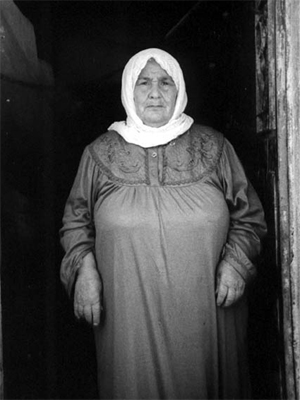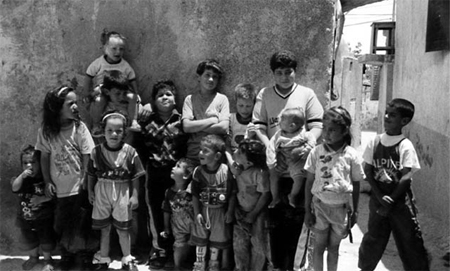
Umm Ali Arslan. Kalandia Camp.
|
 Umm Ali Arslan. Kalandia Camp. |
| Umm Ali Muhasil Arslan, Kalandia camp, June 12:
|
|
Wajih is insistent that I won't regret meeting Umm 'Ali. And he is right. This household is just as full of noisy small children as Umm Awni's, but here there are several adult men who enforce discipline. I was nervous about them being there at first, because women often don't speak freely in the presence of men. But Umm 'Ali proves the exception. Though she's slow to get started since -- like most older women speakers -- she doesn't readily understand what I mean by 'story of your life' or 'recollections'. Here Wajih is helpful -- he keeps drawing her back to her childhood, which otherwise she wouldn't have thought worth mentioning.
Where Umm Awni was small and decorous, Umm Ali is big and self-assertive. I guess that she and Umm Awni are married to brothers but are not related to each other. Once she grasps that we want to hear her speak, she doesn't let the men hold her back but (as I noted at the time) "speaks with excitement and pleasure, in great detail, often returning to points forgotten. Though she sometimes looks to the men for confirmation, she doesn't defer to them or subordinate her testimony to theirs". Here again there's one big room without clear specialization of space. Is this a characteristic of home construction in Gaza transferred to the West Bank? I don't know the camps in Jordan or Syria, but in Lebanon and the West Bank, however small camp homes are, they usually are divided functionally into a |
'salon', bedroom(s), and utility rooms. From descriptions given me about their home in Al-Bassa by cousins of my husband, pre-1948 rural Palestinian housing also typically contained one living room, where everyone -- including married sons and their wives -- slept as well as eating, talking, etc.
Umm 'Ali Arslan speaks: At fourteen I got engaged. [Wajih: Tell her more about your childhood.] We used to go to the sea, to the coast of Jaffa. Always. We used to go swimming. We grew up. And then we went to Gaza. [Wajih: You were dressed for sure?] We were really young, like my grandchildren are now. We wore vests, we swam. My father was very strict with the girls, with my sisters. Once my sister went to learn to sew at a workshop -- may God have mercy on him -- my sister was there and a man came disguised as a woman ... " |
 Umm Ali Arslan's grandchildren. Kalandia Camp. |
[Hajji Aziza Harbi Mansour Arslan] [Ra'ida Shehadeh] Copyright©2005 |
|